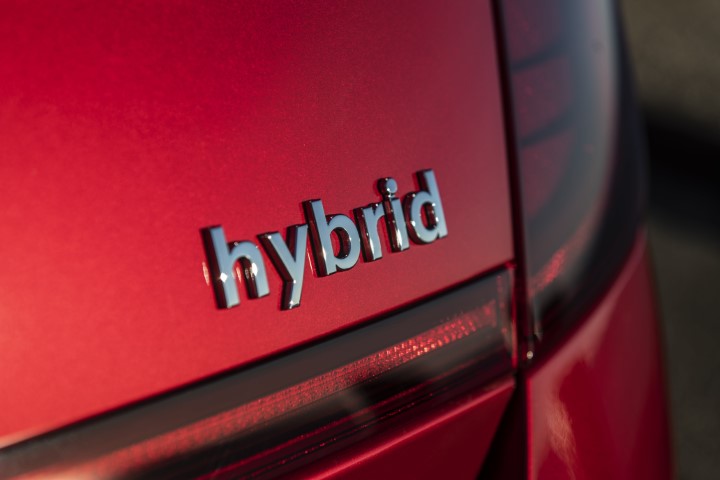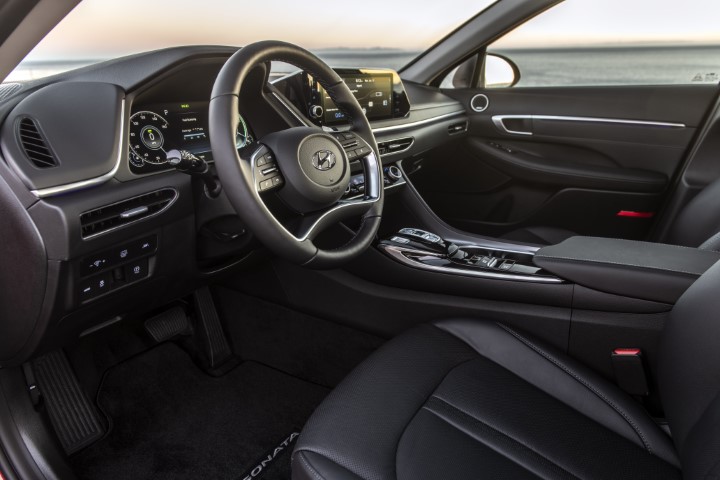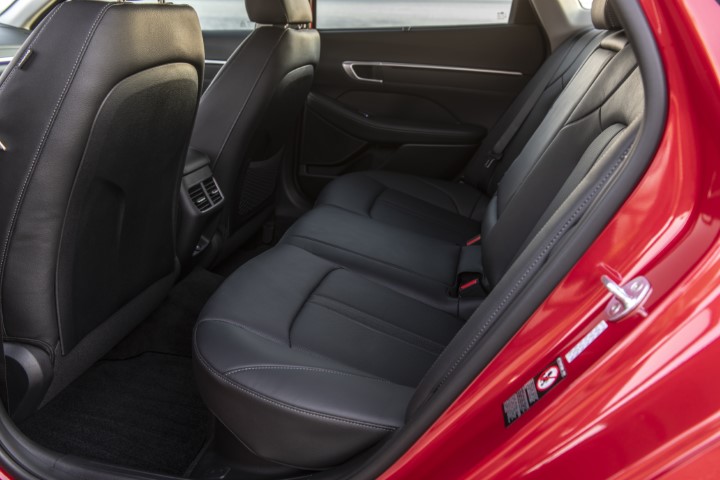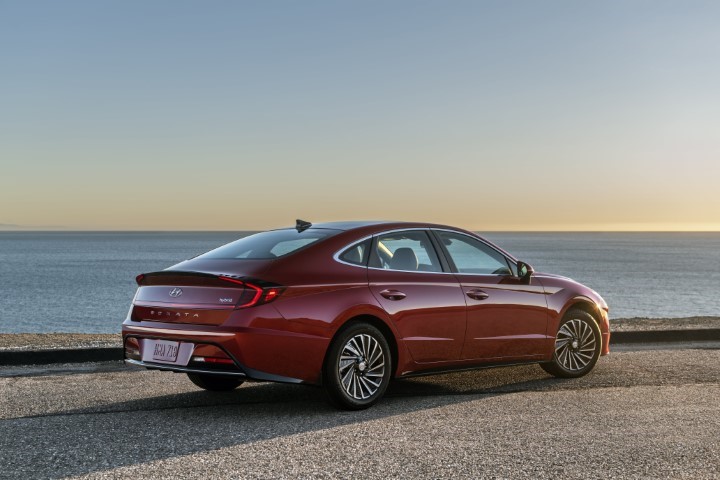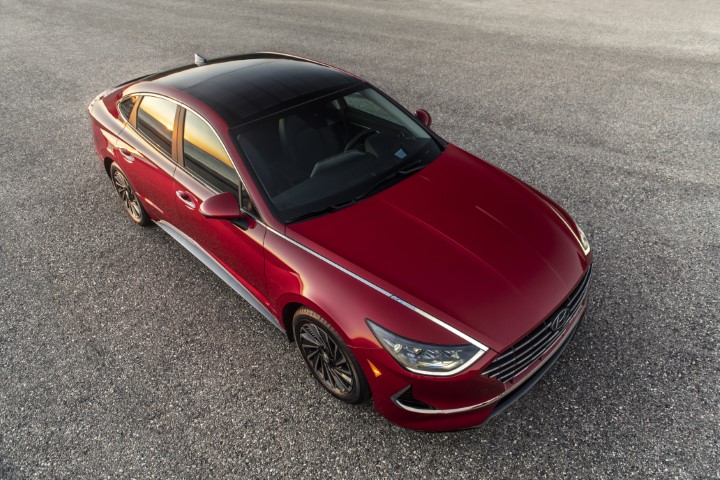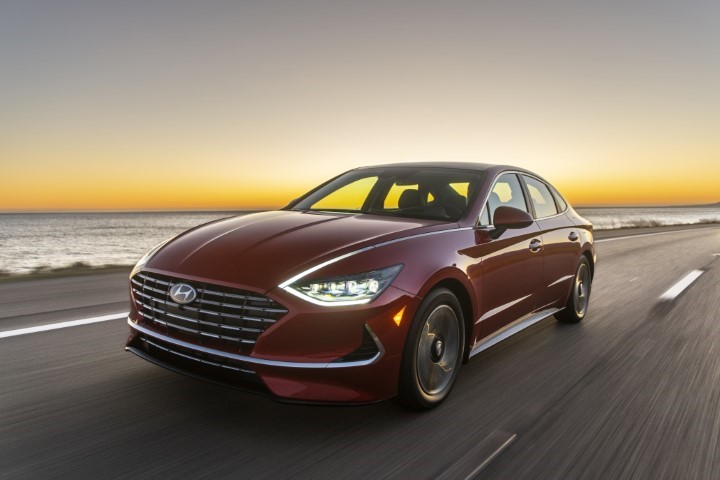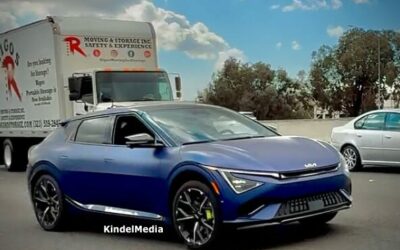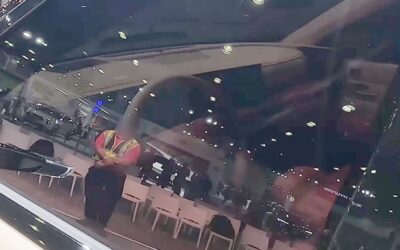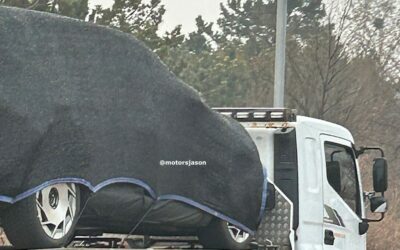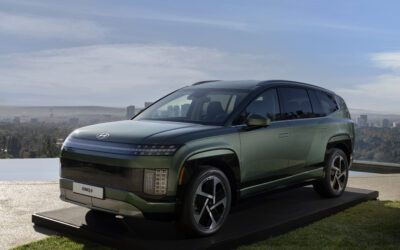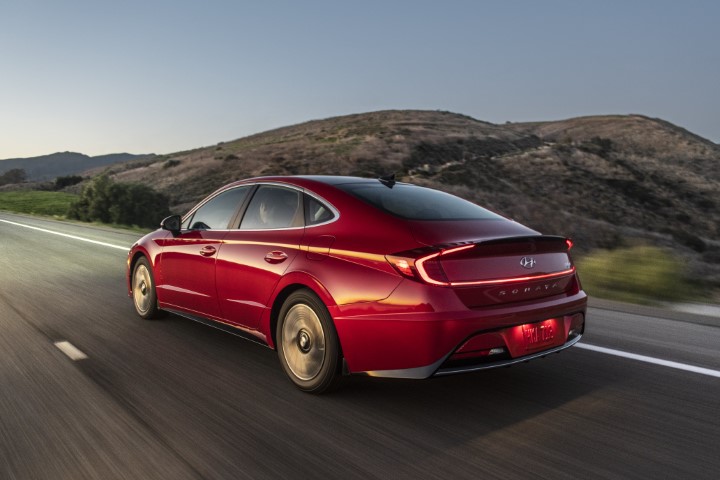
Today at the Chicago Auto Show, Hyundai introduced its new 2020 Sonata Hybrid, boasting 686 miles of driving range and an EPA estimated 52 mpg combined fuel economy rating on the Blue trim. This is the first time the Sonata Hybrid has been shown in North America.
[ads id=”9″]
The 2020 Sonata Hybrid is also equipped with the world’s first Active Shift Control (ASC) technology and a Solar Roof System (SRS), which increase driving range. The new Sonata Hybrid goes on sale this spring and is built in Asan, Korea.
Overview
The 2020 Sonata Hybrid’s exclusive styling has a slippery 0.24 drag coefficient, thanks to a unique cross-hole grille with active air flaps, a rear spoiler and aerodynamic alloy wheels. Hyundai Motor’s Solar Roof System makes its debut on the Sonata Hybrid. This system recharges the hybrid battery while preventing unnecessary battery discharge when the car is off. SRS can increase the driving range by a couple of miles after 6 hours of charging. Engineers also applied Active Shift Control technology to control the electric motor, aligning it with the rotational speeds of the engine and transmission, reducing gear-shifting times by 30%. This synchronization not only improves the Sonata Hybrid’s acceleration and fuel economy but also improves the durability of the transmission by minimizing friction during shifts.

[ads id=”8″]
The Sonata Hybrid is equipped with a Smartstream G2.0 GDi HEV engine and a 6-speed hybrid automatic transmission. The engine’s power output is 150 horsepower and 139 lb.-ft. of torque. The car’s electric motor delivers power output of 39 kW (51 HP) and maximum torque of 151 lb.-ft. of torque. Combined system power output is 192 horsepower and EPA estimated fuel economy numbers are 50 city, 54 highway and 52 combined for the Blue trim.
| Mechanical Specifications | 2020 SonataHybrid | 2020 CamryHybrid | 2020 Accord Hybrid | |
| Gasoline Engine | Size | 2.0L I4 GDI | 2.5L I4 GDI | 2.0L I4 GDI |
| HP/Torque (lb.-ft.) | 150 / 139 | 176 / 163 | 143 / 129 | |
| ElectricMotor | kW (HP) | 39 kW(51 HP) | 88 kW(118 HP) | 135 kW(181 HP) |
| Voltage | 270V | 259V | N/A | |
| Net Horsepower | 192 HP | 208 HP | 212 HP | |
| Fuel Economy | (city/hwy./comb.)EPA estimates | 50/54/52 – Blue 45/51/47 – SEL, Limited | 51/53/52 – LE 44/47/46 – SE, XLE | 48/47/48 – Hybrid |
Solar Roof System
Hyundai Sonata Hybrid’s solar-panel roof directly charges the 12-volt and hybrid batteries and outputs 205 watts of electricity. This system has several benefits:
- Mileage increases by about 2 miles per day
- Helps prevent battery discharge from infotainment or HVAC systems when the car is off
- Unique design cue

[ads id=”9″]
Active Shift Control Technology
ASC technology optimizes transmission efficiency by monitoring gear shifts 500 times per second and precisely adjusting the transmission rotation speed for faster shift times. ASC applies new control logic software to the Hybrid Control Unit (HCU), which aligns the electric motor with the rotational speeds of the engine and transmission to reduce gear shifts by 30%. The technology also delivers smoother gear changes and quicker shift times.
“The development of the world’s first ASC technology is a remarkable innovation that incorporates precise motor control to an automatic transmission,” said KyoungJoon Chang, Vice President and Head of Powertrain Control System Group of Hyundai Motor Group. “It will not only save fuel but also provide a more fun driving experience for our customers.”
Independently Developed Control Logic Software Applied to the Electric Motor
Conventional hybrid vehicles do not have torque converters to improve fuel economy because torque converters lose energy while transferring power to the drive wheels. Although fuel efficient, such a system also requires longer shift times to ensure smoother gear changes.
ASC technology allows the hybrid’s electric motor to also take control of gear shifts by applying new software logic to the Hybrid Control Unit (HCU) to mitigate issues with slower shift time. The HCU monitors the rotational speed of transmission with a sensor installed inside the electric motor at 500 times per second to synchronize the rotational speed with that of the gasoline engine.
The synchronization reduces shift time by 30% from 500 ms to 350 ms. This improves not only the hybrid vehicles’ acceleration performance and fuel economy but also the durability of the transmission, by minimizing friction during gear shifts.
Aerodynamics
The Sonata Hybrid slips through air with 0.24 drag coefficient. The low drag coefficient is accomplished by managing airflow over and under the body. Up front, the Sonata Hybrid has active air flaps behind the grille, which close when less engine cooling is needed. A redesigned rear spoiler further improves airflow. To reduce drag under the body Hyundai engineers added several elements:
- Bumper lip
- Front- and rear-wheel deflectors
- Undercovers in the front and back of the engine bay
- Center floor undercover
- Rear undercover
Digital Key
Continuing to promote the latest advances in technology, the new Sonata Hybrid offers an optional smartphone-based Hyundai Digital Key. Digital Key uses a dedicated mobile app, Near Field Communication (NFC), and Bluetooth Low Energy (BLE) technology to allow a new Sonata to be unlocked, started and driven without a physical key, via a smartphone. Sonata’s Digital Key also allows secure sharing of virtual keys with family and friends.
Sonata owners can tailor the different vehicle functions available to each shared virtual key, and can make the key available for only a defined amount of time. The vehicle owner can preset the duration of vehicle use or limit the use to only certain features when loaning the vehicle, and can also revoke keys remotely. For additional convenience, such as using a valet service or visiting a Hyundai dealer, Hyundai Digital Key also works with an NFC card, which will be provided with each vehicle. Each Sonata still comes with traditional keys. Hyundai Digital Key is compatible only with phones using the Android operating system.
Hyundai Digital Key utilizes NFC technology, which exhibits a high level of security. The NFC wireless data communication takes place only when the device and the reader are placed several centimeters apart.
Optimized Hybrid Battery Placement
By optimizing the placement of the high-voltage hybrid battery, Hyundai engineers were able to increase trunk capacity by 2.5 cubic feet, compared with the 2019 Sonata Hybrid. This placement also helps create best-in-class front headroom and legroom.
| 2020Sonata Hybrid | 2020Camry Hybrid | 2020Accord Hybrid | |
| Headroom (F/R) in. | 40.0/37.8 | 37.5/38.0 | 37.5/37.2 |
| Legroom (F/R) in. | 46.1/34.8 | 42.1/38.0 | 42.3/40.4 |
| Shoulder Room (F/R) in. | 57.9/56.1 | 57.7/55.7 | 58.3/56.5 |
| Hip Room (F/R) in. | 54.6/54.4 | 55.4/54.7 | 55.3/55.0 |
Convenience Technology
The 2020 Sonata Hybrid features a number of advanced comfort and convenience features including an electric parking brake, Hands-free Smart Trunk, Qi high-speed wireless smartphone charging pad with cooling fan, standard Apple CarPlay® and Android Auto®, Text-to-Speech via Bluetooth®, heated and ventilated front seats and split-folding rear seats.
The top-of-the-line audio and navigation display is a wide, high-definition, customizable, 10.25-inch touchscreen monitor with split screens and natural language, and cloud-based speech recognition powered by Blue Link, while the cluster supervision display is a full 12.3 inches. The navigation system includes a bird’s-eye view in navigation maps, and drivers get HD Radio traffic flow and incident data without ever paying for a subscription. Dual Bluetooth support is also available, so two devices can be paired at the same time—one for phone calls and one for streaming audio. The navigation system also comes with three years of Blue Link Multimedia/Map updates. Hyundai’s eight-inch display audio user interface, equipped with Android Auto and Apple CarPlay, is standard on the 2020 Sonata Hybrid. An optional Bose® audio system also delivers an exceptional experience to customers.
SmartSense Safety Technologies
Sonata features Hyundai’s latest SmartSense advanced driver assistance systems (ADAS). A series of sensors and systems, often restricted to luxury cars, combine to potentially warn the driver and may take action in the event of a safety incident. Meanwhile, other ADAS systems can help the driver perform certain tasks using the car’s 3 radar sensors, 12 ultrasonic sensors and 5 cameras. These features include:
- Forward Collision-Avoidance Assist (standard)
- Blind Spot Collision-Avoidance Assist (standard)
- Rear Cross-Traffic Collision-Avoidance Assist (standard)
- Lane Keeping Assist (standard)
- Advanced Smart Cruise Control with Stop and Go (standard)
- Highway Driving Assist (optional)
| Safety Features | 2020 Sonata Hybrid | 2020 Camry Hybrid | 2020 Accord Hybrid | |
| STANDARD SAFETY | Total Standard Airbags | 9 | 10 | 6 |
| Lane Keeping Assist (LKA) | x | x | x | |
| Smart Cruise Control with Stop/Start Capability | x | x | x | |
| Forward Collision-Avoidance Assist with Pedestrian Detection | x | x | x | |
| Daytime Running Lights (DRL) | x | x | x | |
| High Beam Assist | x | x | x | |
| Blind Spot Collision Avoidance-Assist (BCA) | x | O | O | |
| Rear Cross Traffic Collision Avoidance-Assist (RCTA) | x | O | NA |
Highway Driving Assist
Highway Driving Assist (HDA) is a driving convenience system that assists drivers in maintaining the vehicle in the center of the lane, at an appropriate speed, while keeping a set distance from the car in front.
Forward Collision-Avoidance Assist
The 2020 Sonata Hybrid is fitted with standard Forward Collision-Avoidance Assist (FCA) with pedestrian detection, an advanced active safety feature that helps alert drivers to certain emergency situations, and may brake autonomously, if necessary. Using front radar and front camera sensors, FCA operates in three stages. Initially warning the driver visually and acoustically, it helps assess the nature of potential collision danger and may apply increasing amounts of braking force to avoid a collision or minimize damage when a collision is unavoidable.
Lane Following Assist
Lane Following Assist (LFA) may automatically adjust steering to help keep the vehicle centered in its lane of travel. LFA can help keep the vehicle centered on both highways and city streets.
Blind-Spot View Monitor and Blind-Spot Collision Warning (BCW)
The Blind-Spot View Monitor with the Sonata’s outside mirror-mounted cameras offers the driver an enhanced field of vision. The BCW system helps scan for vehicles entering the driver’s blind spot. If the driver activates a turn signal, an image of the view from the corresponding wing mirror appears in the 12.3-inch cluster display. If a vehicle is detected in the blind spot, audible and visual alerts are provided.
Surround-View Monitor
The new Sonata uses four cameras to provide the driver with an enhanced, bird’s-eye view of the car’s exterior, giving the driver confidence when maneuvering into or out of spaces.
Reverse Parking Collision-Avoidance Assist
Reverse Parking Collision-Avoidance Assist helps detect pedestrians and obstacles with a rearview camera and ultrasonic sensors. The system can provide warnings and apply emergency braking to assist in avoidance of a collision.
Touch Sensor Outside Door Handles
Touch Sensor Outside Door Handles on the Sonata Hybrid increase ease of use and further refine the design. To lock the door, the driver need only touch the sensor on the outside of the door handle. Pulling on the handle activates a larger sensor on the inside of the handle to open the door.
Remote Start
Remote Start has been a part of the Hyundai Blue Link system for years. It works by using a cellular data connection to warm up or cool down a Sonata when it is out of sight of the owner. To make that system even better, Hyundai engineers added Remote Start to the 2020 Sonata Hybrid’s key fob on models equipped with Proximity Key and Push Button Start. This allows a remote start to be performed when the car is within the owner’s line of sight.
Blue Link
The connected car team at Hyundai continues to improve Blue Link’s services, and the 2020 Sonata Hybrid received many system enhancements. As with most Hyundai models, Blue Link is complimentary on the 2020 Sonata Hybrid for three years and includes Remote Start with Climate Control, Remote Door Lock/Unlock, Stolen Vehicle Recovery and Destination Search by Voice. These 2020 improvements include:
- Remote Profile Management—stores select vehicle settings to the Blue Link cloud and enables the user to update them remotely and push them back to the vehicle
- Remote Start Enhancements:
- Remote seat heat/vent (full support on/off for each individual heated/cooled seat; ability to adjust level)
- Profile selection (preloads individual driver setting for seating position and side mirrors)
- Vehicle Status Notifications—if the vehicle is left with doors unlocked or windows open, customers will receive a notification
- POI Send to Car now with Waypoints (ability to add up to three waypoints, to be delivered to the vehicle together and which will automatically set order of destinations)
- Maintenance Alert Enhancement—maintenance interval tracking is now visible in the multimedia system, with ability to reset
Quiet Cabin
Several new improvements isolate passengers from unwanted noises:
- Double-junction soundproof glass has been added to the windshield and the front doors

- Improved carpet
- D3 sound absorption materials on the luggage side trim, wheel guard and package tray
- D3 sound absorption materials on the door trim and trunk board bottom
- Reinforcements to the front/rear wheel members

